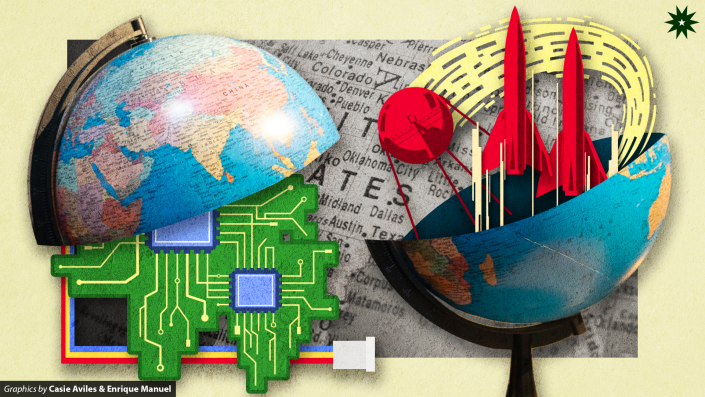The interconnectedness of the modern world has become beneficial to research and development. Through international cooperation, milestones have been achieved in a multitude of fields ranging from the physical sciences to business and commerce.
But the globalized society is not all economy and research—politics is also another looming force. And while politics focuses on government affairs and research centers on inquiry and examination, it is through geopolitics—the influence of geographic factors on the relationships of countries with one another—that one can find a covert connection between both areas.

By the turn of the 20th century, geopolitics was officially coined as an academic discipline—at no better timing, perhaps, as tensions stirred and conflicts arose throughout the world. The question is, how were research and development impacted by geopolitical affairs?
Storms of the past
Herman Kraft, a political science professor at the University of the Philippines Diliman, associates certain global opportunities in research and development to changes in international relations. An example of said change would be the distribution of political power that would eventually lead to conflict among nations. These tides of power shifts can be seen throughout history such as the post-World War II (WWII) era.
The bipolar world order following WWII was evidenced by the geopolitical conflicts between the United States of America (USA) and the Union of Soviet Socialist Republics (USSR), also known as the Cold War. One may argue that the geopolitical rivalry between the two had accelerated their competition and thus resulted in scientific progress. Kraft notes the “space race”—a competition of satellite superiority and spaceflight capabilities between the USA and USSR— promoted impressive progress in aerospace technology. On the other hand, this same rivalry led to the nuclear arms race where both nations began stockpiling nuclear weapons and other war machines.
A transitory period
As history played out, the eventual dissolution of the USSR in 1991 brought the bifurcated tensions to an end. From that point, Kraft posits that the state of research and development shifted toward a multipolar world with various powerful institutions, particularly the developed states.
This new multilateral period of emerging globalization and liberalization, as well as the subsequent fading relevance of geopolitics, had set new trends for research and development. Because of globalization, as Kraft puts it, we have “space for research [that is] beyond just geopolitics and power relations.” Examples of these new trends would be the international effort toward climate and environmental research as well as joint research programs in various other fields like astronomy and particle physics.
A new world order
Two distinct trends can be seen with research when it comes to the state of affairs among states; there is cooperative and multilateral research in the liberal sphere and competitive research driven by power, security, and economics, especially under periods of geopolitical conflicts.
Throughout the last three decades, the balance of power on the world stage once again churned as China’s economic and foreign influences began to rival the USA. With that, Kraft exemplifies this rise of China as a new shift in the geopolitical landscape as the state of research and development—one delineated from the USA—has some similarities to the bifurcated world during the Cold War. In the realm of semiconductors and rare earth metals, which are necessary for modern-day electronics, China and the USA are currently engaged in a “semiconductor race”.
Moreover, a geopolitical crisis regarding energy is stirring in Europe—one brought about by the Russia-Ukraine war. Kraft mentioned this energy crisis could be traced back to the de-emphasis of geopolitics when the USSR collapsed; with minimal tensions, Russia became the leading supplier of natural gas, oil, and coal-based energy to the EU.
Thus, when the Russia-Ukraine war ignited, many of these EU nations found themselves in an energy crisis as Russian-sourced energy became limited, unavailable, or politically unpopular. With that, the subsequent decrease in the reliability of Russian-based energy has seen a shift in research and development toward alternative sources of energy beyond fuel, such as nuclear and solar power.
The local scene
Although the actions of bigger powers are typically what shake the geopolitical landscapes, Kraft explains that the smaller nations, including the Philippines, are usually affected by “spillover effects” from major global powers.
He illustrates how the Philippines is taking an economic approach with China while maintaining relations with the USA despite the geopolitical tensions between the two. However, Kraft also notes how there is very little subject matter—academic research and strategic analysis—from the Philippines when it comes to its own geopolitical strategies. For instance, if the geopolitical tensions between the US and China in the Taiwan Strait escalate, the Philippines may have to choose sides—a dilemma similar to that of Europe and Russia.
Tracing the connection
Evidently, the impact of past geopolitical conflicts can be seen in most of today’s technological marvels. Kraft cites examples such as the use of WWII’s military technologies like cryptography as the basis for the creation of modern-day personal computers and the progression of the digital age. “You do have these kinds of consequences [from] direct competitions between the great powers [that] lead to the advancement and progress of human civilization,” he establishes.
Taking all factors into account, it can be said that geopolitics plays a crucial role in most research and development opportunities worldwide. In the end, a research study or development project may not always come from human aspirations, intrigue, and passion; circumstances arising from the waxing and waning of international entities may act as the guiding hand for research.
